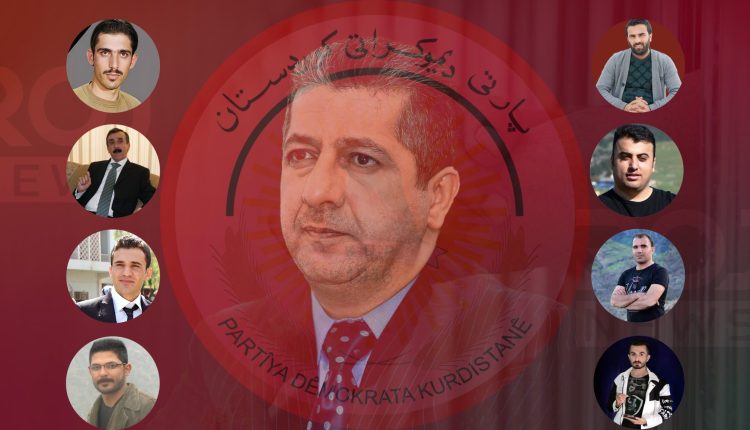For more than three decades, the Barzani family has monopolized political and economic power in the Kurdistan Region of Iraq, concentrating wealth and influence while systematically suppressing any opposition. Under the leadership of Masoud Barzani and his son Masrour Barzani, the region has witnessed a relentless increase in corruption, brutal repression of protesters, and widespread human rights violations.
This is not a series of isolated incidents. The systematic oppression carried out by the Barzanis targets every branch of power in the region—political, economic, and security—and transforms security forces into instruments of intimidation, silencing anyone daring to expose corruption or criticize their policies. Journalists, activists, and ordinary citizens who speak out face harassment, imprisonment, or worse, while public institutions and economic resources are exploited for personal enrichment.
Political Repression and Media Suppression
Since Masrour Barzani became Prime Minister of the Kurdistan Regional Government in 2019, censorship and intimidation have intensified. Journalists and activists report growing harassment, arbitrary arrests, and pressure to self-censor. Independent voices highlighting government failures, corruption, or the mismanagement of salaries and public services have been targeted repeatedly. Peaceful protests are met with excessive force, live ammunition, and the use of snipers, reflecting a strategy of fear and control.
The Kurdish public, particularly in cities like Sulaymaniyah, has increasingly rejected nationalist or party rhetoric, demanding practical solutions to economic and social grievances. Rising discontent reflects the deep mistrust in the feudal and family-dominated parties, whose grip on wealth and political decision-making has left the population frustrated and alienated.
The Barzanis’ Corruption: Local and Global
The Barzanis’ corruption extends far beyond Kurdistan’s borders. Masrour Barzani and other family members have used political influence to transfer funds abroad, manipulate financial systems, and shield their wealth from accountability. Their methods include shell companies, offshore accounts, complex real estate transactions, and misappropriation of oil revenues. This transnational corruption links political power directly to personal enrichment, often at the expense of public institutions and the Kurdish people.
U.S. Court Cases Against the Barzanis
The Barzanis’ long-standing impunity is now being challenged in U.S. courts. On January 30, 2024, lawyers for the Kurdistan Victims Fund filed a landmark lawsuit against Masoud, Masrour, and Waysi Barzani, as well as several key aides. The case meticulously documents decades of corruption, financial crimes, counterfeiting, torture, and murder. Among the allegations, Masrour and Waysi are accused of direct involvement in the murder of a U.S. intelligence officer, with photographs and detailed witness testimony provided as evidence.
The lawsuit exposes how the family used claims of political immunity, offshore accounts, shell companies, and real estate to conceal assets and evade accountability. Misappropriation of oil revenues and public funds further demonstrates the link between political power and personal gain, leaving ordinary Kurds to bear the cost.
Masrour’s attempts to dismiss the case under sovereign immunity are undermined by his U.S. permanent residency, which subjects him to legal and financial scrutiny. Established precedents, including the Torture Victim Protection Act and the Alien Tort Statute, make clear that U.S. courts can hold non-American officials accountable for transnational crimes. Similarly, financial fraud, corruption, and diversion of public resources cannot be shielded by traditional diplomatic immunity. The extensive documentation, witness testimonies, and photographs mark an unprecedented moment in Kurdish history, holding a once untouchable political dynasty accountable.
The Barzanis’ Legacy of Oppression
Under the Barzanis, the Kurdistan Region has experienced escalating economic hardship, unpaid salaries, worsening public services, and a systematic crackdown on dissent. Political and security institutions are monopolized by family members and loyalists, ensuring that any challenge to their authority is suppressed. The result is a society where fear and inequality are entrenched, while public wealth is funneled to a powerful elite.
The Barzanis’ control over Kurdistan is not only a domestic problem—it is now a transnational issue, with courts abroad scrutinizing decades of corruption, abuse, and human rights violations. Genuine stability and prosperity for the Kurdish people require dismantling dynastic control, ensuring accountability, and establishing democratic governance that respects human rights, transparency, and the rule of law.
